Key takeaways:
- Understanding local zoning laws is crucial for successfully navigating property and business development, as they dictate land use and can impact project feasibility.
- Community engagement around zoning changes reveals residents’ desires and priorities, highlighting the importance of public involvement in shaping local environments.
- Strategies for effective zoning compliance include thorough preparation, open communication with local officials, and adaptability to changing regulations to mitigate challenges during the application process.
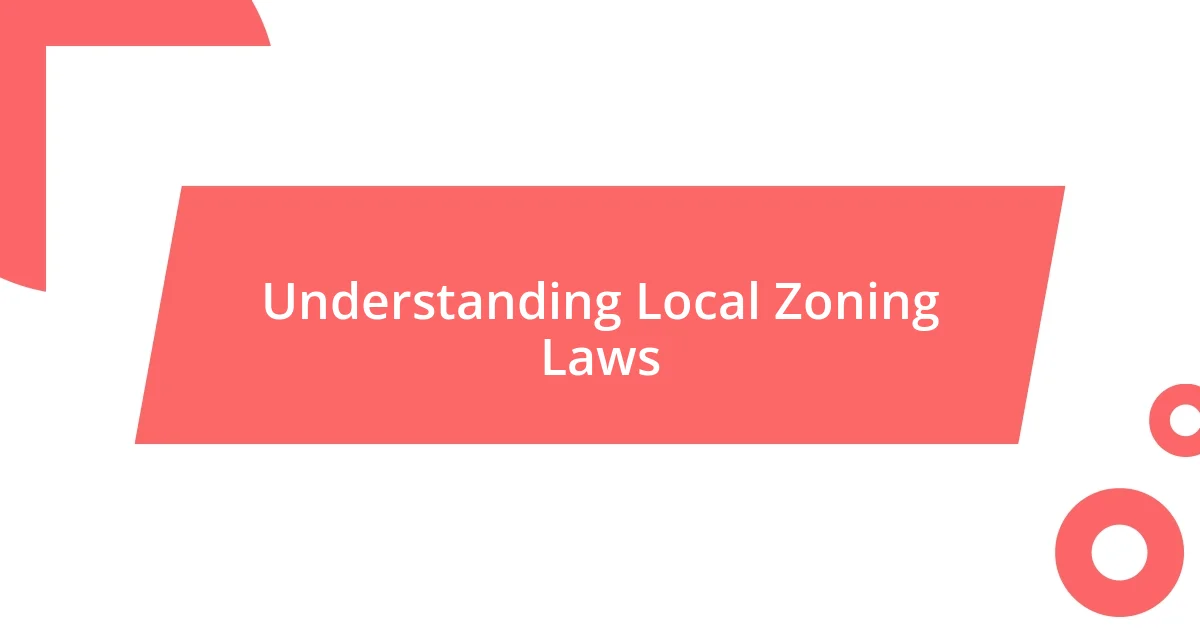
Understanding Local Zoning Laws
Local zoning laws are fascinating yet often misunderstood regulations that dictate how land can be used in a given area. I remember one time when I learned this the hard way while trying to open a small café. I was excited, but soon discovered that the location I had my eyes on was zoned for commercial use only during specific hours, which meant my dream was off to a rocky start. Have you ever felt the sting of discovering something isn’t allowed when you thought it was? It can be disheartening.
Understanding these laws involves digging into classifications like residential, commercial, and industrial zones. These categories determine what types of buildings can be constructed and what activities can take place. During my research, I found them to be like a hidden roadmap, guiding community development yet sometimes stifling creativity. Have you ever wondered how these rules were created? They often reflect historical land use patterns and community preferences, which can vary widely.
Navigating the nuances of zoning ordinances can feel overwhelming, especially when you start dealing with variances and special use permits. I once attended a zoning board meeting out of sheer curiosity, and it was eye-opening. Hearing the debates about what could and couldn’t go up in my neighborhood gave me a clearer picture of community dynamics. It made me realize that zoning laws are not set in stone; rather, they evolve with the community’s needs and aspirations. Isn’t it intriguing to think about how these regulations impact our daily lives in ways we might not even notice?
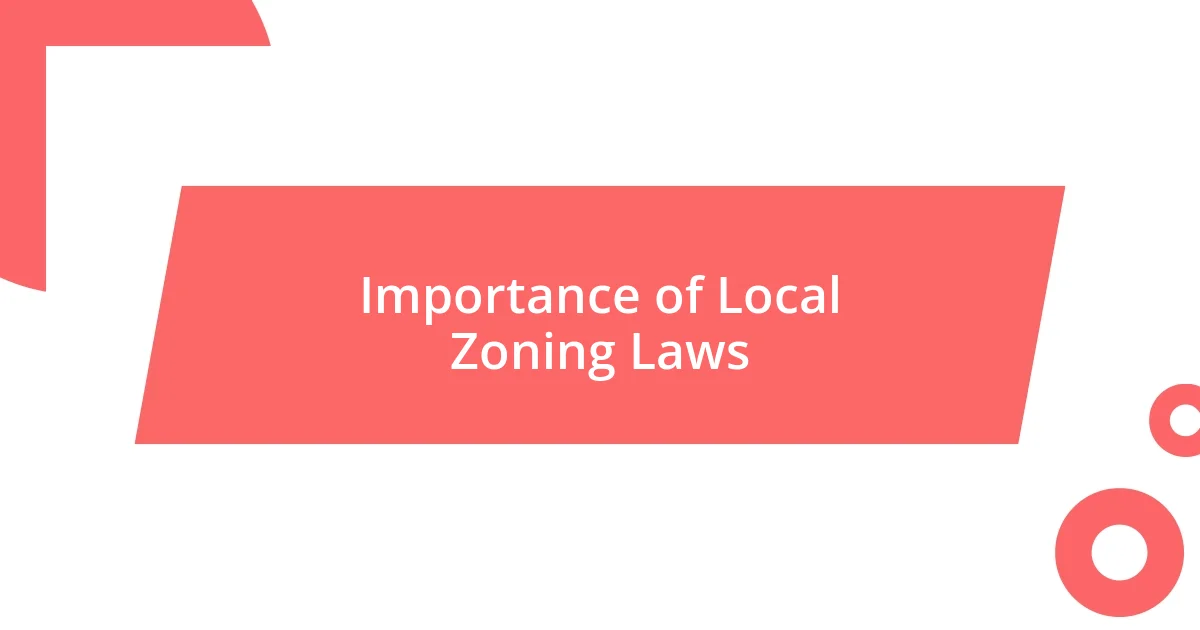
Importance of Local Zoning Laws
Local zoning laws play a pivotal role in maintaining the structure and aesthetic of a community. I recall a friend who wanted to build a multi-story apartment complex in a serene neighborhood. The neighborhood was zoned for single-family homes only, and the pushback from residents was fierce. It underscored for me how zoning laws can protect the community’s character and ensure that developments align with residents’ desires. Have you ever thought about how the rules shape the environment you live in?
The significance of these laws goes beyond mere regulations; they influence property values and investment decisions. In my experience, when I invested in a property without checking zoning restrictions, I was blindsided by the limitations placed on renovations. It taught me a valuable lesson about due diligence. Wouldn’t it be frustrating to feel stuck with a property that can’t fulfill your vision? Zoning laws are essential for both protecting neighborhoods and guiding responsible development.
Moreover, zoning laws often address critical issues such as environmental concerns and public safety. I remember attending a community meeting discussing zoning changes aimed at preserving green spaces. The passion in the room was palpable, illustrating how these laws can reflect a community’s collective values. Seeing neighbors rally for changes that promote sustainability was inspiring. How often do we stop to appreciate the community effort that shapes our living spaces?
| Aspect | Local Zoning Laws |
|---|---|
| Definition | Regulations that determine land use in specific areas |
| Impact on Community | Shapes development, property values, and neighborhood aesthetics |
| Public Involvement | Encourages community participation in planning decisions |
| Challenge for Developers | Can impose restrictions and require adjustments to plans |
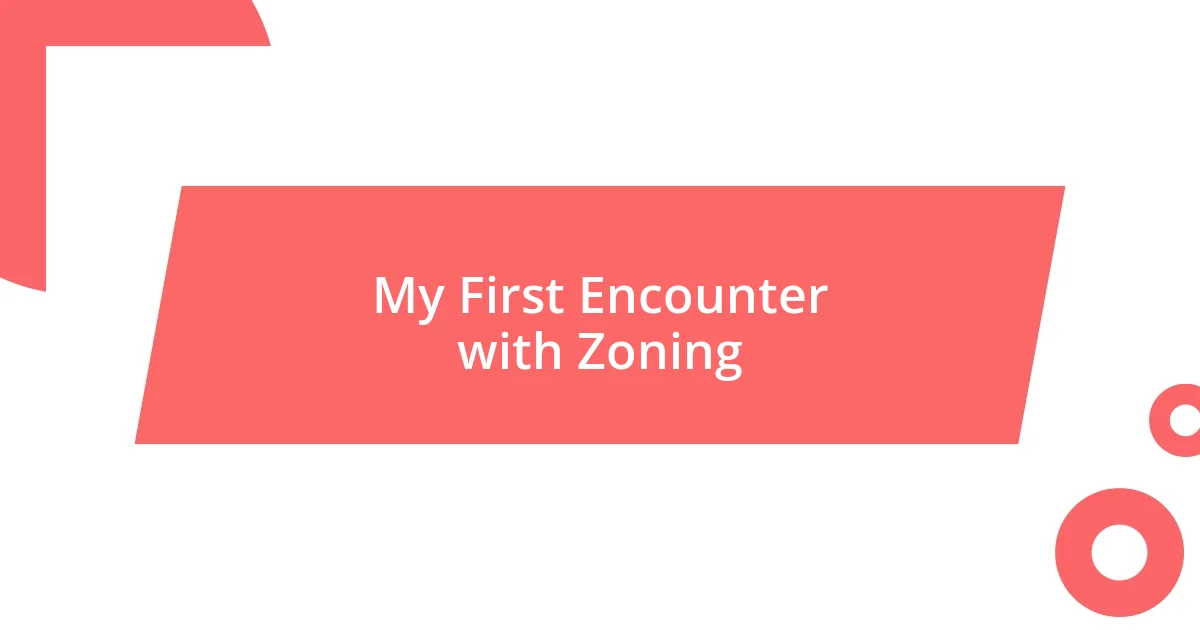
My First Encounter with Zoning
I’ll never forget my first brush with zoning laws when I was searching for the perfect spot to launch my café. I had found what appeared to be an ideal location, the atmosphere buzzing with potential. However, once I dived into the zoning regulations, I learned that the area was restricted to certain business types, causing my excitement to plummet. The realization hit hard: a dream can easily be thwarted by regulations I hadn’t even considered.
- The location’s zoning only allowed for specific business hours.
- I learned the hard way that I needed to research zoning before falling in love with a property.
- This encounter opened my eyes to the importance of understanding local regulations.
Shortly after that debacle, I found myself at a community meeting discussing proposed zoning changes. The palpable mix of hope and anxiety in the room was incredible. I saw residents passionately advocating for a new park, our shared conversation illuminating what our neighborhood needed. It wasn’t just about rules; it was about dreams, community, and the kind of environment we wanted for ourselves. That evening, I felt a spark of determination to get involved and understand these laws better, discovering how intimately they shape our spaces and, ultimately, our lives.
- I experienced the community’s passion firsthand.
- It was a powerful moment to see individuals united for a common goal.
- This encounter motivated me to explore more about how zoning affects our daily lives.
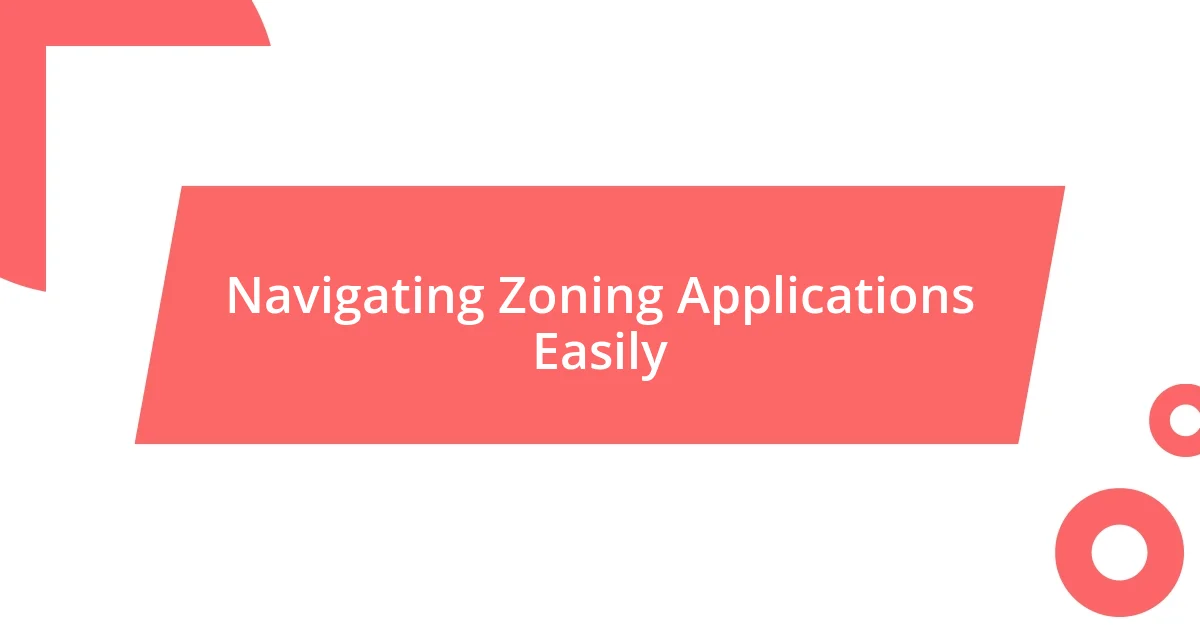
Navigating Zoning Applications Easily
Navigating zoning applications can often feel like a daunting labyrinth, but there are ways to make the process smoother. When I first approached a zoning board with a request for a small business, I took the time to attend several preliminary meetings. Listening to the discussions, I found that understanding the board’s concerns helped me tailor my application more effectively. Have you considered how being proactive at these meetings can build rapport with decision-makers?
I remember feeling overwhelmed by the documentation required for my application. It was a mountain of forms, but one tip I learned was to reach out directly to the zoning office. They not only provided clear guidance on what was needed but also helped me avoid common pitfalls. Connecting with knowledgeable individuals can truly make a difference—did you know that many offices have resources specifically designed to assist applicants?
Another invaluable lesson emerged from my experience: patience is key. As I waited for feedback on my application, I found myself second-guessing every detail I submitted. Eventually, I came to realize that many applicants face similar tensions and timelines. Keeping a positive outlook and staying organized made the waiting game less stressful—have you ever found that a little patience can bring unexpected clarity?

Dealing with Zoning Variances
When I first considered applying for a zoning variance, I was both excited and apprehensive. The thought of altering the established norms felt daunting. After gathering my thoughts, I learned that presenting my case convincingly was crucial. I remember preparing a detailed presentation, complete with visuals and community support letters, which made a world of difference. Have you ever felt uncertain about how to justify your requests? I found that clarity and confidence can turn hesitation into empowerment.
As I stood in front of the zoning board, I felt a mix of nerves and determination. I shared not only my vision for the property but also how it would positively impact the community. It dawned on me that zoning variances are not just about individual desires; they reflect a larger conversation about community needs. During that meeting, I realized that openness to feedback could foster goodwill. It’s amazing how a little vulnerability can lead to stronger community relationships, don’t you think?
After my variance was approved, the real work began. I had to ensure compliance with any additional conditions set by the board, which at times felt overwhelming. But I learned that staying organized and maintaining communication with local officials was key to navigating these requirements. Did you know that it’s common for initial approvals to come with stipulations? This experience taught me that flexibility and a willingness to adapt go hand-in-hand with success in zoning matters.

Common Zoning Challenges Faced
Many applicants face the challenge of interpreting complex zoning regulations, which can feel like deciphering a foreign language. I recall the time I encountered unconventional terminology that left me scratching my head. It wasn’t just about understanding the words; it was crucial to grasp the underlying concepts. It made me wonder—have you ever felt lost in the details and wished for simpler explanations?
Another common hurdle is overcoming community resistance. When I proposed changes to my property, I was met with skepticism from some neighbors. Their concerns about potential impacts on traffic and property values were valid and needed addressing. This experience taught me the importance of community engagement; have you noticed how fostering open dialogue often diminishes fear and mistrust?
Lastly, timing is another critical zoning challenge I faced. Each requirement had specific deadlines, and missing one could stall the entire process. I learned early on that creating a timeline with targeted milestones was essential for staying on track. It made me reflect—how often do we underestimate the power of a well-laid plan in reducing stress? Having a proactive approach saved me from potential headaches and ensured I kept the momentum going.
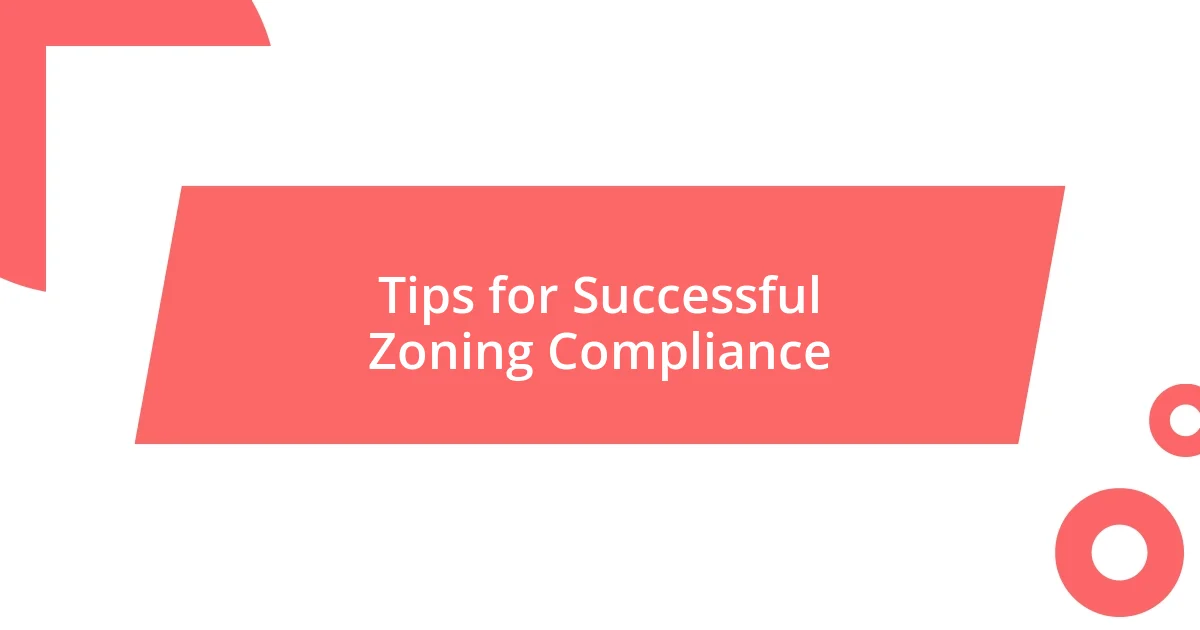
Tips for Successful Zoning Compliance
Navigating local zoning laws can feel overwhelming, but having a checklist can be a game-changer. I remember compiling essential documents, including property surveys and site plans, to ensure I didn’t miss anything important. Have you ever found yourself scrambling for paperwork at the last minute? Creating a thorough checklist brought me peace of mind and helped me feel prepared rather than panicked.
Communication is another cornerstone of successful zoning compliance. I learned this the hard way when I failed to connect with a local planning officer before my presentation. By the time I did, I realized I had overlooked some critical recommendations. It made me think—how often do we assume we know it all when a simple conversation could provide invaluable insights? Engaging in proactive dialogue with local officials can not only clarify requirements but also establish a rapport that can be beneficial later on.
Finally, remain adaptable in your approach. During my journey, I faced unexpected changes in regulations that required me to pivot quickly. I remember feeling a wave of frustration, but then I asked myself—what’s the worst that could happen? Embracing flexibility turned out to be one of my greatest assets. I learned that being open to adjustments can lead to creative solutions and even better outcomes than I initially envisioned.















